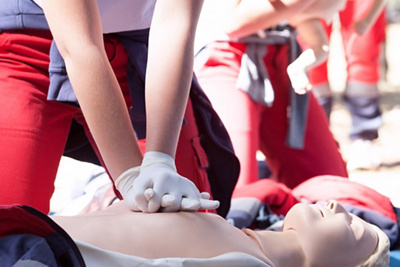Charné Giesing, an ER24 Advanced Life Support (ALS) paramedic in Pretoria, talks about her role.
How did you know you wanted a career in emergency medicine?
When I was in high school, I saw someone drive into the gate of our church. The paramedics had to extricate the patient, sedate, and splint him. It was like watching a live TV medical drama. From that day on, I was set on a career as a paramedic.
What qualifications do you need to be an ALS paramedic?
You must complete a two-year Diploma in Emergency Medical Care. This qualification is offered by accredited institutions, and graduates register with the Health Professions Council of South Africa (HPCSA) as a paramedic. Mediclinic offers the Diploma in Emergency Medical Care at its Higher Education and Training institution in Cape Town.
What level of care can you deliver at the scene of an accident?
As a mid-level ALS paramedic, I’m qualified to assist in rescue, ICU transfer, and ventilator transfers. At the scene of an accident or injury, I can perform procedural (conscious) sedation and advanced airway management. If a patient is experiencing shock, severe dehydration, cardiac arrest, major trauma or airway compromise, I’m able to establish an external jugular drip (a central line in the neck to administer fluids and medication), or an intra-osseous (IO) infusion – we drill into the bone to establish a drip directly into the bone marrow.
I can administer adrenaline shots and deliver an electrical shock (defibrillation) to help a patient’s heart re-establish an effective rhythm. ALS paramedics are also able to perform a surgical cricothyrotomy. This is an incision made through the skin and cricothyroid membrane (ligament in the neck) to establish an airway during life-threatening situations, such as airway obstruction by a foreign body, or massive facial trauma.
What qualities do you need for your job?
Apart from being an operational paramedic, I must also make sure all crews have the necessary stock, and I manage the staff roster, too. Working in the field of emergency medicine is not just a job – it’s a calling. You need to be well-rounded and show empathy, respect, integrity, and pride in your work. Every day, we help injured, frightened, angry, and frustrated people, so we need to be patient, calm, and reassuring too. It’s also important to have an ongoing curiosity about medical advances. Continuous professional development (CPD) courses keep me on my toes because things change constantly.
Plans for the future?
I’ve started getting involved with our fixed-wing emergency medical services. Flying with critically ill patients in remote parts of Africa is an exciting professional challenge for me. The adrenaline keeps me going – there’s no time to be bored in this profession.


